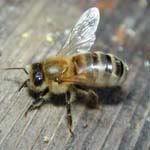We really are trying to kill ourselves, aren't we?

Corn seed is coated with Bayer’s pesticides by means of an adhesive developed by another industry giant: Monsanto. Despite studies which showed these pesticides are highly toxic to bees, their use was justified with the reasoning that the corn seed to which they were applied would be buried in the soil where it would presumably be harmless to other creatures. This was a grave mistake.
The first clue that Colony Collapse Disorder was the result of poisoning, similar to the DDT bird kill-off decades ago, was when clothianidin was used on corn crops in Germany’s state of Baden-Wurttemberg. In July of 2007, the German crop was infested with root worms.
The German government ordered that every possible method should be used to eradicate this pest, including the use of neonicotinoids. Shortly after the seeds were planted, in May of 2008, some 330-million bees abruptly died. The global phenomenon has continued to this day, resulting in millions of dead colonies… billions of dead bees.
An investigation revealed that the seed coating did not stay in the soil but was introduced to the air (and the rest of the plant) by simple abrasion – the rubbing together of seeds – as they are stored, moved and planted. The German government quickly banned this pesticide, gave compensation to the farmers and issued a strong warning against using this chemical in agriculture. According to the German Federal Agriculture Institute, “It can unequivocally be concluded that poisoning of the bees is due to the rub-off of the pesticide ingredient clothianidin from corn seeds.”
According to the German Research Center for Cultivated Plants, 29 out of 30 dead bees had been killed, in the 2008 study, by direct contact with clothianidin. Philipp Mimkes, spokesman for the German-based Coalition Against Bayer Dangers, said: “We have been pointing out the risks of neonicotinoids for almost 10 years now. This proves without a doubt that the chemicals can come into contact with bees and kill them. These pesticides shouldn’t be on the market.”

No comments:
Post a Comment